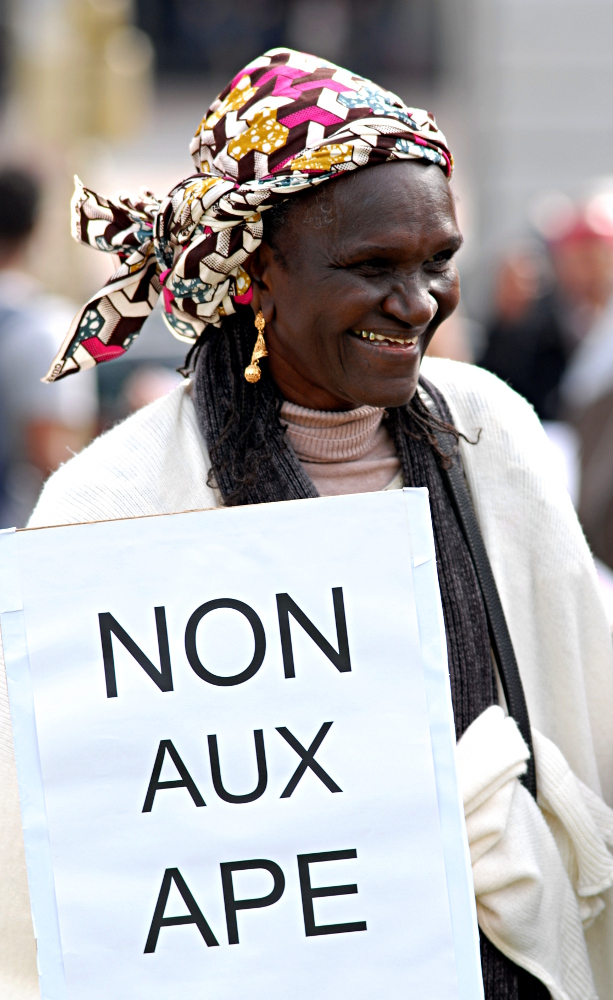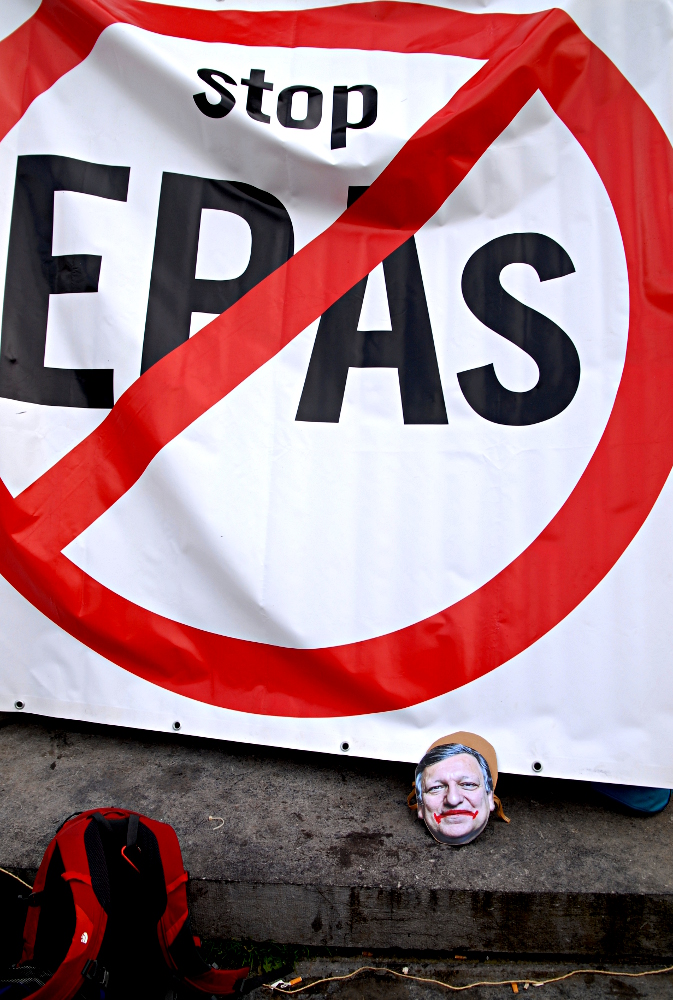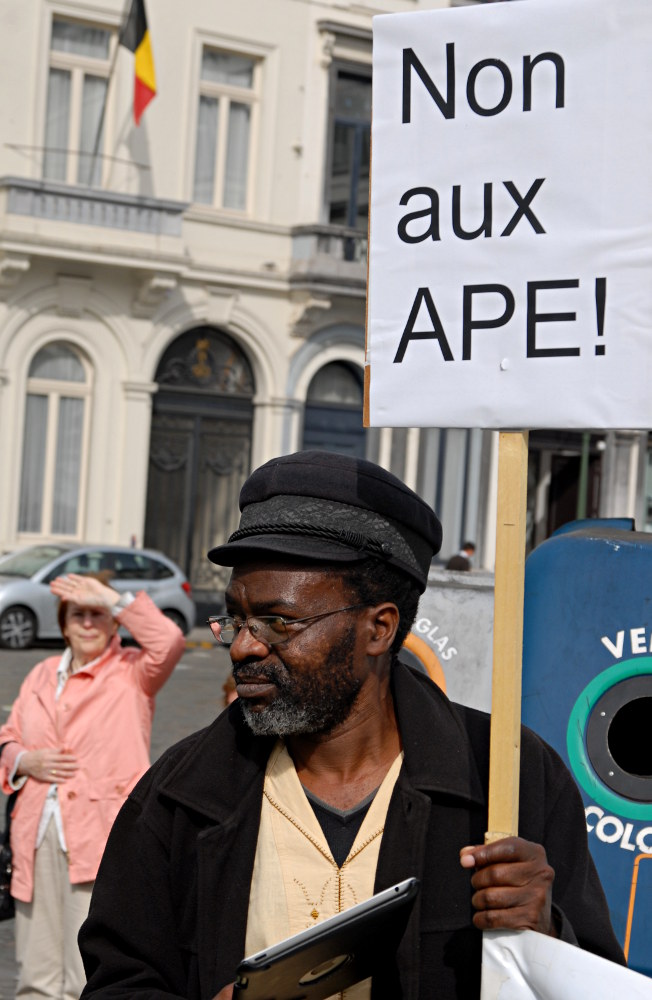Saying NO! to free trade agreements
Today, on the 2nd of April, activists from Africa and Europe are staging a protest action in front of the European Parliament in Brussels to make the voices of the poor and marginalised citizens heard. Holding banners and chanting slogans to the beat of djembe drums, they asked the African and European governments to prioritise peoples’ rights and interest in their trade deals and particularly, in the EU trade and development policies with Africa. Why do they protest at this particular moment and what is Burghard Ilge of Both ENDS doing there?
More harm than good
On the 2nd and 3rd of April, the EU-Africa summit is taking place in Brussels. To the African Union this would have been a perfect platform to reopen the discussion about EPAs: controversial Economic Partnership Agreements between the EU and African countries or regions. These agreements generally do and have done much more harm than good to the population of many African countries. This is why many civil society groups, including Both ENDS, have been calling upon decision makers for years to stop these practices.



Decide now
"As expected, the EU did not see the need to put the issue on the agenda for the current summit, but to many African countries the matter is very urgent indeed," says Burghard. "Before October this year, they have to decide whether they want to agree to the EPA’s as they are currently proposed. The EU puts pressure on many countries in Africa to rush into accepting what the EU has put on the table. EPAs, like other EU free trade agreements, are very likely to benefit European trade and commerce, but harm the local population of these African countries."
The trade policy that Africa needs
This is why 50 trade justice campaigners from Europe and Africa gather simultaneously in Brussels for an international seminar titled: 'The EPA that the EU imposes versus the trade policy that Africa needs'. They are joined by African farmers’ representatives and food security and tax justice activists, all trying to convince the European and African decision makers that there are indeed alternatives, and that EPA’s should stop right away.
More information:
January 2014: African Union Declaration on Trade issues
27 September 2012: 10 years of EPAs not enough?
June 2012: Joint publication 'EPAs - still pushing the wrong deal for Africa'
11 October 2011: Activists on their way to Brussels
October 2006: Fact sheet EPA's
Read more about this subject
-
 Dossier /
Dossier /Trade agreements
International trade agreements often have far-reaching consequences not only for the economy of a country, but also for people and the environment. It is primarily the most vulnerable groups who suffer most from these agreements.
-
 Dossier /
Dossier /Investment treaties
Investment treaties must be inclusive, sustainable and fair. That means that they must not put the interests of companies before those of people and their living environment.
-
 Dossier /
Dossier /Rights for People, Rules for Corporations – Stop ISDS!
Indigenous communities in Paraguay saw their attempts to regain their ancestral lands thwarted by German investors. In Indonesia, US-based mining companies succeeded to roll back new laws that were meant to boost the country’s economic development and protect its forests. This is the level of impact that investment treaties can have on social, environmental and economic development and rights. Why? Because of the ‘Investor-to-State Dispute Settlement’ clauses that are included in many such treaties.
-
 News / 5 november 2025
News / 5 november 2025Another ISDS claim hits the Netherlands: Petrogas sues over solidarity contribution and royalty regulations
SOMO and Both ENDS strongly condemn the newly revealed investor-state dispute settlement (ISDS) case filed by Petrogas, an Omani oil and gas company operating two shallow-water gas fields in the Dutch North Sea, against the Netherlands under the Netherlands-Oman bilateral investment treaty (BIT).
-
Publication / 16 oktober 2025
-
Publication / 16 oktober 2025
-
 Dossier /
Dossier /International trade and investment with respect for people and planet
The network of international trade and investment treaties is large and complex. The Netherlands alone has signed more than 70 bilateral investment treaties (BITs) and is party to the trade and investment agreements concluded by the EU, like the EU-Mercosur and EU-Indonesia trade deals.
-
 News / 23 september 2025
News / 23 september 2025With the undemocratic splitting of the EU-Mercosur deal, Europe is missing the chance to lead on fair trade
Recently, many newspapers have written about Brussels’ rush to finalize the trade agreement between the EU and the South American Mercosur countries. According to the European Commission, national parliaments do not need to approve it because the trade part and the “political” part have been separated. This “splitting” means that the trade part can be approved as an EU-only decision by the European Council and the European Parliament, while national parliaments are sidelined and the political-cooperation part is postponed. Both ENDS and its partners are deeply concerned and are calling on the Dutch government to vote against this outdated agreement.
-
 News / 22 september 2025
News / 22 september 2025EU-Indonesia Trade Deal Threatens Communities and Environment
On September 23th the European Union and Indonesia concluded their negotiations of the EU-Indonesia Comprehensive Economic Partnership Agreement (CEPA), a free trade agreement between the EU and Indonesia. Both ENDS condemns this agreement for favoring corporate interests over those of local communities and the environment.
-
 News / 11 september 2025
News / 11 september 2025EU-Mercosur: Small GDP Gain, Big Question Marks for Farmers and Democracy
A recent report by Wageningen Economic Research (WER) on the economic consequences of the trade agreement between the EU and Mercosur confirms what civil society organizations, policymakers, and trade unions have been signaling for years: this agreement does not offer a balanced perspective for farmers and the environment. Instead, it increases power inequalities and shifts burdens onto (small-scale) farmers. Moreover, the deal risks reinforcing unsustainable practices that complicate the climate transition and addressing environmental challenges in both the EU and Mercosur countries.
-
 Dossier /
Dossier /Towards a socially and environmentally just energy transition
To address the climate crisis we need to urgently transition away from fossil fuels towards clean, renewable energy. However, this transition is not only about changing energy sources. It requires an inclusive and fair process that tackles systemic inequalities and demanding consumption patterns, prioritizes environmental and social justice, and which does not repeat mistakes from the past.
-
 Blog / 17 juli 2025
Blog / 17 juli 2025A disaster for farmers: here and there
The trade agreement with South America is harmful to farmers, the climate, and biodiversity, on both sides of the Atlantic. It’s time to take this deal off the table once and for all, argues Fernando Hernandez, Senior Policy Officer for Trade and Investment at Both ENDS.
-
 Dossier /
Dossier /Fair Green and Global Alliance (FGG)
Together with civil society organisations from all over the world, the Fair Green and Global (FGG) Alliance aims for socially just, inclusive and environmentally sustainable societies in the Netherlands and the Global South.
-
 News / 5 juni 2025
News / 5 juni 2025Op-ed: New trading partners, but not on the same terms
Since President Trump's trade war and tariffs, international trade has once again been thrust into the spotlight. In Europe and the Netherlands, there are growing calls for new free trade agreements to be concluded as quickly as possible, as reflected in recent opinions in FD and de Volkskrant. But that is the wrong reflex, writes our colleague Marius Troost.
-
 Press release / 18 februari 2025
Press release / 18 februari 2025Trade deal fueling resource grab? 120+ groups from Europe and Indonesia sound the alarm
Brussels, 18 February 2025 - Over 120 civil society organizations and trade unions from Indonesia and Europe today call on the Indonesian government and the European Union to stop the negotiations for the Indonesia-EU free trade agreement – the Comprehensive Economic Partnership Agreement (CEPA).
-
 News / 22 januari 2025
News / 22 januari 2025 -
Letter / 9 december 2024
People and the Planet Entebbe Declaration: Reclaiming investment frameworks for people and the planet
The time for change is now. Civil society demands international investment
frameworks that are aligned with economic justice, social and environmental
sustainability, and the needs of communities worldwide. -
 News / 11 november 2024
News / 11 november 2024Kenya Terminates Bilateral Investment Treaty with the Netherlands
The government of Kenya has officially terminated its bilateral investment treaty (BIT) with the Netherlands, marking a significant win for economic justice and environmental protection. Kenya’s decision reflects a growing global trend of rethinking outdated treaties that often prioritize corporate interests over public welfare. The Dutch Minister for Foreign Trade and Development recently confirmed that Kenya unilaterally ended the treaty in December 2023, rendering it inoperative from 11 June 2024. Kenya now joins South Africa, Tanzania, and Burkina Faso as the fourth African country to terminate its BIT with the Netherlands.
-
 News / 12 maart 2024
News / 12 maart 2024Equality as a key for international trade
Trade has been in the global spotlight once again in recent times. Recently, ministers from around the world gathered in Abu Dhabi at the WTO for negotiations on world trade in the coming years. However, participants from civil society were silenced. Never before has their freedom been so severely restricted at the WTO. In a time when geopolitical tensions are escalating by the day, it is crucial to prioritize equality in international trade. -
Publication / 30 oktober 2023








